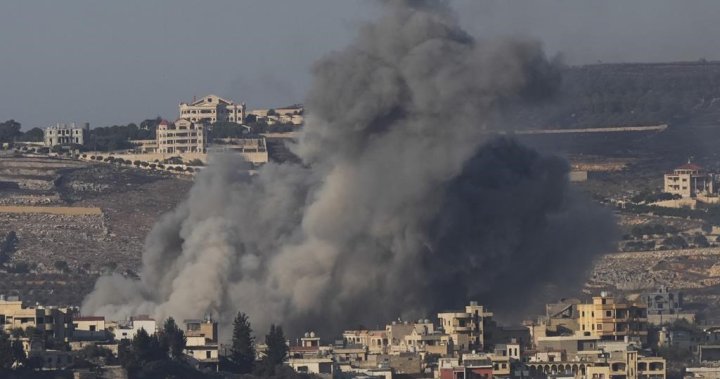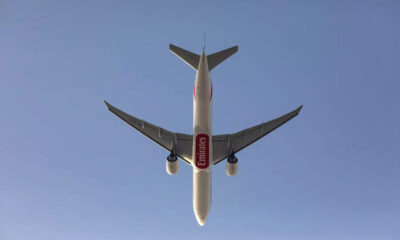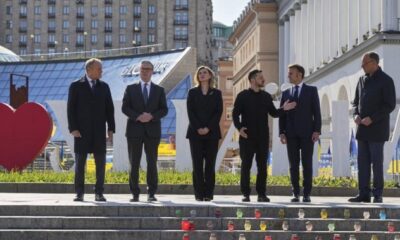Breaking News
Ottawa secures more flights out of Lebanon as some Canadians face delays – National

The federal government has reserved about 900 additional seats on commercial flights out of Lebanon through Sunday to get Canadian citizens out of the country, Foreign Affairs Minister Melanie Joly says.
“I want to make sure that you are brought to safety, and please take the seat,” Joly told reporters in Paris on the sidelines of the Francophonie summit, speaking directly to Canadians in Lebanon.
“At this point, not all seats are being taken.”
About 650 seats were reserved for Canadian citizens on two flights from Beirut to Istanbul on Thursday, but Global Affairs Canada said those flights left with only 275 passengers in total — including nationals from other countries such as the U.S., Australia, New Zealand, and Denmark.
More than 340 Canadians left on government-reserved flights earlier this week.
Nearly 900 more reserved seats are spread out across one flight per day between Friday and Sunday, Joly said.

The government is offering the seats to Canadians in Lebanon who have filled out an intake form requesting departure information. More than 5,000 have filled out that form, Global Affairs Canada said Thursday, and 2,300 of those have received offers of seats.
Canada has been urging citizens and permanent residents to leave Lebanon by commercial means as the conflict between Israel and Hezbollah escalates.
Joly noted Beirut is also becoming more dangerous, pointing to a strike in the centre of the capital Thursday that killed at least nine people. The Israeli military also extended evacuation orders beyond a southern border zone the same day, signaling that it may widen a ground operation launched earlier this week.
The reservations are meant to ensure Canadians get a seat as demand for commercial flights skyrockets. Global Affairs Canada on Thursday said regular flights out of Beirut have been reduced by half, but there are still between 50 and 80 flights leaving daily.

The government has yet to order a military evacuation, despite other countries doing so, although the Canadian Armed Forces has been preparing for such an action.

Get breaking National news
For news impacting Canada and around the world, sign up for breaking news alerts delivered directly to you when they happen.
Canadian military assets and troops have been pre-positioned in Cyprus, an island nation off the coast of Lebanon, for weeks. Global News has learned more personnel are on the way from Princess Patricia’s Canadian Light Infantry.
Tents have been erected in the Port of Larnaca to process the potential mass exodus of thousands of foreign nationals set to arrive in simultaneous military evacuations by up to 10 countries — including Canada, France, Australia, and Britain.
Cyprus previously served as a hub for foreign evacuees during the 2006 Lebanon War, taking in 60,000 people.

Sources have told Global News the pre-positioning of assets was done to prepare for a potentially chaotic evacuation operation, with multiple countries set to try and get their people out at the same time with limited space.
Greece, the Netherlands and China, among other countries, have already evacuated their citizens out of Lebanon. Spain plans to send two military aircraft to evacuate as many as 350 citizens this week, Reuters reported.
The G7 on Thursday issued a statement on the escalating situation in the Middle East and called for “a cessation of hostilities as soon as possible to create space for a diplomatic solution” in Lebanon. It also reiterated calls for an immediate ceasefire in Gaza.
Canadians voice frustration
News of additional commercial flights comes amid criticism from some Canadians of how the government has handled its offers of seats and overall communication during the crisis in Lebanon.
Global Affairs Canada says it needs to vet all requests for departure information for admissibility into Canada before offering seats. It has committed to responding to all requests in the coming days.
That process is taking too long, Ammar Hussein told Global News — and is putting his mother and uncle, both Canadian citizens stuck in Lebanon, at risk.
“It’s very stressful and it’s frustrating,” the Ontario man said.

Hussein said his mother and uncle registered with Canada’s Registration of Canadians Abroad system close to two weeks ago to get updates on departures and consular services. He signed up too on his mother’s behalf just to ensure someone in the family could be contacted, and the family has filled out the request form for departure information.
Since then, he says Global Affairs Canada has not reached out, and Hussein is unable to get anyone on the phone.
Hussein said it was especially frustrating to hear Joly and other government officials suggest this week that some people are declining offers of seats.
“Israel is beheading Lebanese infrastructure, so people are without cellphone service, Wi-Fi, data. They’re travelling through dangerous places,” Hussein said.
<
-

 Destination8 months ago
Destination8 months agoSingapore Airlines CEO set to join board of Air India, BA News, BA
-

 Breaking News10 months ago
Breaking News10 months agoCroatia to reintroduce compulsory military draft as regional tensions soar
-

 Tech News12 months ago
Tech News12 months agoBangladeshi police agents accused of selling citizens’ personal information on Telegram
-

 Gadgets3 months ago
Gadgets3 months agoSupernatural Season 16 Revival News, Cast, Plot and Release Date
-

 Productivity11 months ago
Productivity11 months agoHow Your Contact Center Can Become A Customer Engagement Center
-

 Gadgets3 weeks ago
Gadgets3 weeks agoFallout Season 2 Potential Release Date, Cast, Plot and News
-

 Breaking News10 months ago
Breaking News10 months agoBangladesh crisis: Refaat Ahmed sworn in as Bangladesh’s new chief justice
-

 Toys12 months ago
Toys12 months ago15 of the Best Trike & Tricycles Mums Recommend























